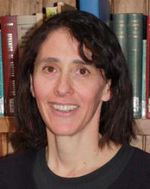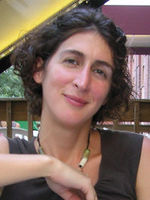SFI Short Course 2015 - Faculty 2015
From Santa Fe Institute Events Wiki
| Education Event Navigation |
Program Director

Melanie Mitchell, External Professor, Santa Fe Institute; Professor, Computer Science, Portland State University
Bio
Melanie attended Brown University, where she majored in mathematics and did research in astronomy, and the University of Michigan, where she received a Ph.D. in computer science, Her dissertation, in collaboration with her advisor Douglas Hofstadter, was the development of Copycat, a computer program that makes analogies. She is the author or editor of five books and over 70 scholarly papers in in the fields of artificial intelligence, cognitive science, and complex systems. Her most recent book, Complexity: A Guided Tour, published in 2009 by Oxford University Press, is the winner of the 2010 Phi Beta Kappa Science Book Award. It was also named by Amazon.com as one of the ten best science books of 2009, and was longlisted for the Royal Society's 2010 book prize.
Faculty (partial list)

W. Brian Arthur, External Professor, Santa Fe Institute; Visiting Researcher, Intelligent Systems Lab, PARC
Bio
W. Brian Arthur holds a Ph.D. from Berkeley in Operations Research, and has other degrees in economics, engineering and mathematics.
Arthur pioneered the modern study of positive feedbacks or increasing returns in the economy--in particular their role in magnifying small, random events in the economy. This work has gone on to become the basis of our understanding of the high-tech economy.
Arthur was the first director of the Economics Program at the Santa Fe Institute in New Mexico, and has served on SFI's Science Board and Board of Trustees.
Arthur is a frequent keynote speaker on such topics as: How exactly does innovation work and how can it be fostered? What is happening in the economy, and how should we rethink economics? How is the digital revolution playing out in the economy? How will US and European national competitiveness fare, given the rise of China and India?

Robert Axtell Department Chair and Co-Director of the Computational Public Policy Lab
Bio
Rob Axtell earned an interdisciplinary Ph.D. degree at Carnegie Mellon University, where he studied computing, social science, and public policy. His teaching and research involves computational and mathematical modeling of social and economic processes. Specifically, he works at the intersection of multi-agent systems computer science and the social sciences, building so-called agent-based models of a variety of market and non-market phenomena.
His research has been published in the leading scientific journals, including Science and the Proceedings of the National Academy of Sciences, USA, and reprised in Nature, and has appeared in top disciplinary journals. Stories about his research have appeared in major magazines (e.g., Economist, Atlantic Monthly, Scientific American, New Yorker, Discover, Wired, New Scientist, Technology Review, Harvard Business Review, Science News, Chronicle of Higher Education, Byte, Le Temps Strategique) and newspapers (e.g., Wall St. Journal, Washington Post, Los Angeles Times, Boston Globe, Detroit Free Press, Financial Times). He is co-author of Growing Artificial Societies: Social Science from the Bottom Up (MIT Press) with J.M. Epstein, widely cited as an example of how to apply modern computing to the analysis of social and economic phenomena.
For nearly 15 years he was Senior Fellow in Economic Studies, Foreign Policy Studies, and Governance Studies at the Brookings Institution (Washington, D.C.) where he helped found the Center on Social and Economic Dynamics (CSED) there. During this time he taught courses on his research as Mellon Distinguished Visiting Professor at Middlebury College (2004), Visiting Professor of Economics of the Graduate Faculty of Political and Social Science at the New School for Social Research (2003), Adjunct Professor of Computer Science at Georgetown University (2002) and Visiting Associate Professor of Economics at Johns Hopkins (1998-2000).
Upon moving to Mason in 2006 he helped found the Department of Computational Social Science in 2007, the first department of its kind in the world, and has served as Department Chair since 2008. During the 2013-14 academic year he spent a sabbatical year as Visiting Professor in the Complexity Economics Programme at Oxford University's Mathematical Institute and Oxford Martin School, and visiting fellow of Hertford College. For many years he has been External Professor of the Santa Fe Institute in New Mexico. Most recently he has co-founded and is Co-Director of the Computational Pubic Policy Laboratory, a joint project of the Krasnow Institute for Advanced Study and the School of Policy, Government and International Affairs (SPGIA) at Mason.

Aaron Clauset, External Faculty, Santa Fe Institute; Assistant Professor of Computer Science, University of Colorado at Boulder

Mirta Galesic Professor, Santa Fe Institute; Cowan Chair in Human Social Dynamics, Santa Fe Institute
